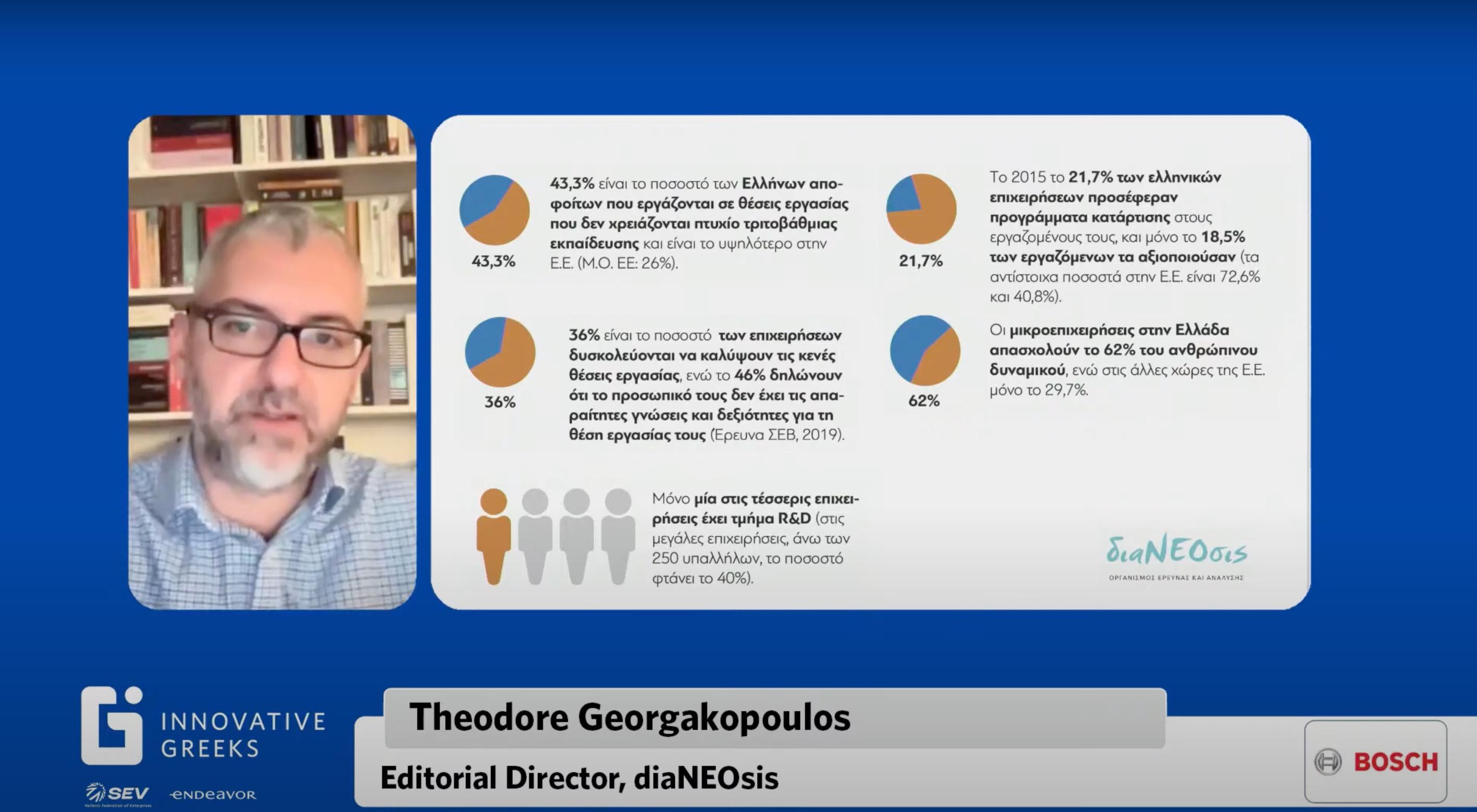
5 minute read
diaNEOsis Presentation: Innovation in Greece today


Advertisement

Private sector investment in research and innovation remains quite low, according to the Dianeosis’ survey.
The data, presented by the Director of Dianeosis, Thodoris Georgakopoulos, shows that private sector spending on research and development stands at 0.59%of GDP compared to 1.42% in the EU.
Between 2011 and 2013, only one in seven Greek companies had some form of cooperation with a university or research centre and only one in four companies had a research and development department. On the other hand, public spending on research is approaching the EU average and today stands at 0.68% GDP compared to 0.7% in the EU. The research also shows that although Greek researchers are active participants in EU research programs, they develop very few patents.
In his message to the conference, Deputy Foreign Minister Costas Fragogiannis pointed out that at his Ministry, innovation is at a high level in what they think and what they do. He referred in particular to the program to transforming Astypalea into a green island and to the introduction of scientific diplomats served by a funding bill aiming to bring the academic community closer to the professional community.


Fireside chat with the Minister of Digital Government Kyriakos Pierrakakis and Michael Kratsios

Summary
Looking to top examples like Israel and Estonia, Greece and the US now both find themselves at their own respective stages in pursuing digitalization within the public sector. On this occasion, Marcos Veremis of Upstream moderated the fireside chat between Kyriakos Pierrakakis, Greece’s Minister of Digital Governance and Michael Kratsios, 4th Chief Technology Officer of the United States, to learn more about how they are infusing tech into citizens’ interaction with their government.
Quotes
• Marcos Veremis: [Young start-uppers may] have this impression that the government or the state, and technology and entrepreneurship and innovation don't really mix. Now, I keep telling them that [in] places like Silicon Valley, [...] , Israel, or even the Nordics, these ecosystems were largely born out of precisely this kind of collaboration between the government or the state, and private enterprise, and young people, researchers, etc.
• Michael Kratsios: The innovation ecosystem [is] something that has to be one part private sector, one part academia, and one part government, and there's no way that an innovation ecosystem can succeed without each part of the ecosystem pulling together and adding its value to the system. • Kyriakos Pierrakakis: The country [..] has had the hardware I would say, for quite a long time, but [what was missing was] the software -- the proper rules of the game, the policies, lawmaking, regulation -- all those types of measures and initiatives that provide us with the capability to fully unleash this potential.
Key Takeaways
Digital transformation of the public service, requires a particular mix to bring the public and private spheres together. Mr. Kratsios maintained that the private sector, academia and government collectively form an "innovation ecosystem". In the US, this translated into the government"investing in early stage pre-competitive basic research and development", academia acting as the intermediate “glue” that continues the research, and the private sector picking up at later stages with commercialization etc.. Each pillar should play to its own strengths in contributing to driving innovation.
Mr. Pierrakakis illustrated how Greece recently set the stage to play to its strengths with the deployment of 5G networks in a tiered approach. It was designed “with a specialised venture capital fund ingrained within the spectrum auction” to instrumentalize the auction so that many players could benefit from the spectrum auction. Not just big private sector players but stakeholders such as research centres, universities, and startups.
Veremis asked both participants whether Greece should be investing in early stage R&D for technology that may not be commercially viable yet. Kratsios encouraged the use of models like the one used in Greece's 5G auction, to take proceeds and use them to reinvest in people building products in the same space. Pierrakakis said that, with his counterpart at the Ministry of Defense, Nikos Panagiotopoulos, they are looking to rework mandatory army service to include an “injection” of digital skills. Greece’s tech leaps can allow it to leapfrog as is demonstrated but its groundbreaking vaccination platform.
In his role as CTO of the United States, Kratsios was involved in coordinating tech policy across federal agencies as diverse as health and human services, to the Department of Energy. That work included removing barriers to innovation and coordinating R&D spending. A recent example is the work on adapting regulatory language to allow doctors to offer telemedicine during the pandemic. He clarified that the US is not trying to create a digital interface with APIs as offered by Estonia. The context and division of jurisdictions in the US means that the federal government is more focused on providing services that are as seamless as possible to citizens, at their most common touchpoints. Be it tax filings or arranging a visit to a national park.
Pierrakakis instead, treats Estonia's model as a compass but a different way to get there is needed. There is no ‘one size fits all approach” and instead, it is important to combine learnings from other countries and adapt them for Greece. When COVID, the Ministry of Digital Governance went from being a strategic ministry to an operational one, involved in all different facets of government. With the proper team and financial capabilities in place, Pierrakakis' ministry has set off to implement their plan which includes a Digital Bible and over 400 projects over the coming four years that will cumulatively see a "leapfrogging effect" for the country.










